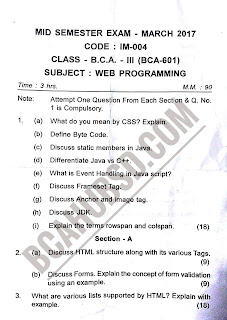6TH SEMESTER-
2. Fundamentals of Java: Java Vs. C++, Byte Code, Java virtual machine, constants, variables, data types, operators, expressions, control structures, defining class, creating objects, accessing class members, constructions, method overloading. String handling. Inheritance : Basics, member access, using super to call super class constructors, creating a multi level hierarchy, method overriding, dynamic method dispatch, using abstract classes, using Final.
3. Packages and Interfaces: Defining a package, understanding CLASSPATH, Access protection: Importing packages, Interfaces, Defining an Interface, Implementing Interfaces, Applying Interfaces, Variables in Interfaces. Exception Handling: Fundamentals, Exception types, Using Try and Catch, Multiple Try and Catch clauses, Nested Try statements, Built–in exceptions.
4. Multi-threaded Programming: The Java Thread model, Thread priorities, Synchronizations, Messaging. The thread class and runnable interface, The Main Thread : Creating a Thread, Implementing Runnable, Extending Thread, Creating Multiple Threads, Thread Priorities; Synchronizations : Methods, Statements, Inter Thread Communication, Deadlock, Suspending, Resuming and Stopping Threads. I/O Applets : I/O Basics : Streams, The predefined streams; Reading console I/P, Writing console O/P. The print writer class; Reading and Writing files. Applet fundamentals, Using AWT controls: AWT Classes, Adding and Removing Controls, Responding to Controls, Controls and their classes, Graphics and Text , Layout Managers: Understanding Layout Manager, FlowLayout, BorderLayout, GridLayout, CardLayout. Menus, Event handling: Two Event Handling Mechanisms, Delegation Event Model (Events, Event Sources, Event Classes, Event Listeners, Sorces of Events, Event Listener Interfaces, Handling Mouse and Keyboard Events.
SECTION-A
1. Review of forms in HTML, Introduction to cascading style sheets (CSS), defining and applying CSS. Java Script: Features, tokens, data types, variables, operations, control structs, likes, strings arrays, functions, core language, objects, client side objects, event handling. Applications related to client side form validation.
SECTION-B
2. Fundamentals of Java: Java Vs. C++, Byte Code, Java virtual machine, constants, variables, data types, operators, expressions, control structures, defining class, creating objects, accessing class members, constructions, method overloading. String handling. Inheritance : Basics, member access, using super to call super class constructors, creating a multi level hierarchy, method overriding, dynamic method dispatch, using abstract classes, using Final.
SECTION-C
3. Packages and Interfaces: Defining a package, understanding CLASSPATH, Access protection: Importing packages, Interfaces, Defining an Interface, Implementing Interfaces, Applying Interfaces, Variables in Interfaces. Exception Handling: Fundamentals, Exception types, Using Try and Catch, Multiple Try and Catch clauses, Nested Try statements, Built–in exceptions.
SECTION-D
4. Multi-threaded Programming: The Java Thread model, Thread priorities, Synchronizations, Messaging. The thread class and runnable interface, The Main Thread : Creating a Thread, Implementing Runnable, Extending Thread, Creating Multiple Threads, Thread Priorities; Synchronizations : Methods, Statements, Inter Thread Communication, Deadlock, Suspending, Resuming and Stopping Threads. I/O Applets : I/O Basics : Streams, The predefined streams; Reading console I/P, Writing console O/P. The print writer class; Reading and Writing files. Applet fundamentals, Using AWT controls: AWT Classes, Adding and Removing Controls, Responding to Controls, Controls and their classes, Graphics and Text , Layout Managers: Understanding Layout Manager, FlowLayout, BorderLayout, GridLayout, CardLayout. Menus, Event handling: Two Event Handling Mechanisms, Delegation Event Model (Events, Event Sources, Event Classes, Event Listeners, Sorces of Events, Event Listener Interfaces, Handling Mouse and Keyboard Events.
 |
| 2017 |
 |
| 2017 |
 |
| 2018 |
 |
| 2018 |


Comments
Post a Comment
Thanks for the comment and don't forget to subscribe.